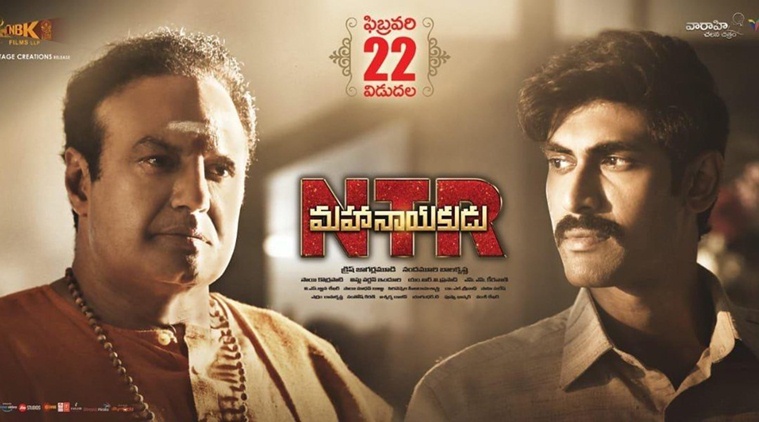
NTR: Mahanayakudu movie cast: Nandamuri Balakrishna, Vidya Balan, Rana Daggubati
NTR: Mahanayakudu director: Krish
NTR: Mahanayakudu rating: 2 stars
NTR: Kathanayakudu, which hit screens on January 10, narrated the larger-than-life story of NT Rama Rao, and his rise to the stature of demi-god in Andhra Pradesh by playing a series of mythological characters on the big screen. The film ended when Balakrishna’s NT Rama Rao announced his political plunge along with his new party, Telugu Desam Party (The Land Of Telugus).
NTR: Mahanayakudu, which released today (February 22), picks up the story from where the first part ended. And again, director Radha Krishna Jagarlamudi, who is popularly called Krish, fills up the movie with plenty of trivial information that adds little to his narration or the cinematic experience of the audience. The director, who was also responsible for the script of this two-part biopic, makes his characters blurt out irrelevant details throughout the film.
For example, there is so much conversation about NTR’s Chevrolet van, which became famous after the star incorporated it into his political campaign. The old Chevrolet was christened as Chaitanya Ratham, in which NTR lived during the course of his political campaigning for 1983 elections in Andhra Pradesh. It revolutionized the methods of political campaigning across the country.
There is so much back and forth between NTR and people in his inner circles about the technicalities of using Chaitanya Ratham for political campaigning. We are even told little details, but none of it explains NTR’s emotional connection with Chaitanya Ratham.
In another scene, at the peak of his political campaign, NTR expresses his inability to attend the marriage of his sons. And this also come across as a trivial attempt to play up a very well-known fact. The majority of the film, part one included, is made up of a series of passing references to the achievements of an iconic personality in cinema and politics. We get very little emotion, nuance, depth, and taste of professional filmmaking in both installments.
The main problem with Krish’s biopic is the absence of subtext. There is nothing beyond the action and images that we see on the surface. An in-depth screenplay could have made us really feel for NTR when his government was overthrown by power-hungry politicians. The audience’s reaction to NTR’s suffering is likely to be as superficial as the screenplay.
Having said that, NTR: Mahanayakudu pulled me into the narration, for a short while, when NTR loses his government in an ugly power grab. What got to me is the fact that like mainstream Indian cinema, even the state of the country’s politics is stuck in a time loop. Watching the film in Karnataka found more resonance as the state has been grabbing headlines over the controversies of horse-trading and politicians trying to exploit loopholes to grab power. The shameless antics of politicians on the floor of the assembly to prevent proceedings, hiding the MLAs from rival parties to protect them from bribery or threats, among other things, are surprisingly even prevalent in today’s politics.
Unlike his glorious 35-year-long stint in cinema, NTR’s life in active politics was not always filled with sunshine and rainbows. It was dotted with upheavals and historic moments of Indian politics. A historic story of the new regional political party bringing an all-powerful national party to its knees by rallying opposition parties across the country would have been explored magnificently by a sharp director to provide an engaging cinematic spectacle. However, Krish feels contented with the idea of playing to the gallery.
Vidya Balan as NTR’s wife Basavatarakam doesn’t have many scenes in the film. Even the times she appears on the screen, she doesn’t get moments to shine. Krish has packed the screenplay with so much trivia of one man; he has no space to write in scenes where the audience can develop a real feel for the characters. Rana Daggubati as Chandra Bau Naidu, NTR’s son-in-law, makes his presence felt on the screen despite the short duration. His controlled performance as a sharp but mellow politician fills up the screen. Balakrishna as NTR again hits it out of the park, but his performance is let down by an amateur screenplay. Composer MM Keeravani’s background score and songs complement cinematographer Gnana Shekar V.S’s frames that celebrate NTR’s larger-than-life image.
NTR Mahanayakudu feels slightly better than NTR: Kathanayakudu. But, when I think of everything the second part could have achieved cinematically, it hurts real bad.